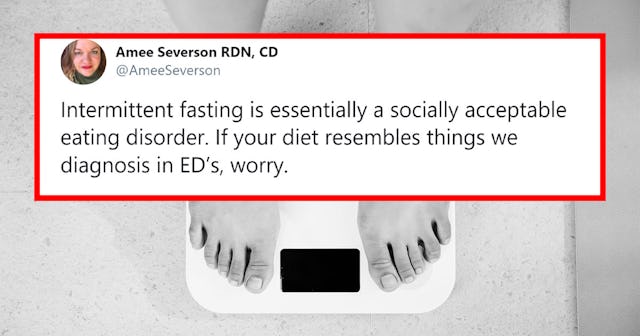Registered Dietitians Weigh In On The Intermittent Fasting Trend

Intermittent fasting is the latest dieting craze to hit our shores. The diet is basically just what it sounds like: you pick out chunks of time where you will fast and times where you will eat. Usually people pick 14-16 hour chunks for fasting. For example, they’ll skip breakfast and make sure not to eat past 7 p.m. and all night while they sleep. Or they will fast completely for two days each week, eating normally the rest of the time.
Excuse me while I curl myself in a ball and cry. Honestly, does this sound like anything more than a glorified eating disorder?
Twitter/fyeahmfabello
Now, before you go on about how intermittent fasting is not a “diet” but rather a lifestyle choice or some other nonsense like that, of course it’s a freaking diet. Anytime you are following a certain system, regime, or eating structure, it’s a diet. Diets aren’t necessarily bad in and of themselves. Some people need to follow diets for health reasons, such as folks who are diabetic, have food allergies, or battle chronic health conditions.
Probably one of the most appealing aspects of intermittent fasting–and why people are so adamant that it is not the same as “dieting”– is that you get to eat whatever you want when you do eat, which means you don’t have to count calories, eat certain types of foods, or limit intake during your “on” times.
Restricting your eating times to certain set hours of the day almost always means that you are not paying attention to your instinctual hunger cues–and these are exactly the behaviors that lead to disordered eating patterns. Not only that, but even if intermittent fasting “works” for you for a certain amount of time, it doesn’t sound sustainable at all.
Apparently, people do often lose weight on these diets…well, at least for as long as they are able to follow them. A study referenced by Harvard School of Public Health found that 29-38% of participants dropped out of the diet within the first six months. Systemic reviews, also referenced by Harvard School of Public Health, found the initial dropout rate for the diet to be as high as 65% in some cases.
As for my concerns about the healthiness of the diet? Well, many followers tout the diet’s health benefits, such as lower blood pressure, higher energy, improved moods, and improved memory. Some say following the diet will lower your risk of diabetes, and other say intermittent fasting will help you live longer.
But hardly anyone—save for a few registered dietitians on Twitter—seem to be talking about the mental health effects of the diet, the fact that anyone with a history or propensity for an eating disorder should not be on such a restricted diet, and that starting such a diet might trigger a disordered eating pattern.
I actually have my own personal story about intermittent fasting, though it wasn’t called that when I did it. My story takes place 20 years ago, when I was in college. I’d developed an unhealthy relationship with food in my late-teens, binging to deal with some unresolved trauma and anxiety–and gaining a ton of weight.
So when I realized that I could “fast” all day, consuming nothing besides coffee–and still getting to eat a reasonable dinner and feel basically okay–I was all in.
I lost about 20 pounds eating this way. I was a size zero, which I’d never been before–and never have been since.
I had to stop the diet when I began getting dizzy spells and migraines. But I was honestly never the same after that. Until I was about 35, I couldn’t eat normally. Even after I wasn’t restricting myself anymore, food was a constant trigger for me.
Finally, soon after my second child was born, I said fuck it, gave up dieting completely, decided to accept my size for what it was, and ate what I wanted. It was a glorious revelation.
I can’t help but think about my experience when I hear about intermittent fasting. And considering almost everyone I know has a messed up relationship with food and fad diets are proven to be absolutely non-sustainable, I can’t help but think that intermittent dieting is not only too good to be true, but is potentially very dangerous as well.
Besides all that, we all know what’s going to happen with intermittent dieting, right? Everyone and their mom is going to try it. Eventually, they’ll all drop out of the diet—because starving yourself all day is not healthy or sustainable—and nearly everyone will regain all the weight they lost. Then a new diet craze will peak in popularity, and the cycle will continue.
If you don’t believe me, read the research on dieting. DIETS DON’T WORK. They simply Do. Not. Work.
But the sad thing is until we change the for-profit, toxic diet culture we all steeped in, most of us will fail at a diet like intermittent dieting, and then simply move onto the next one (some detox bullshit, the latest incarnation of low-carb dieting, etc.) continuing a pattern of disordered eating and feeling miserable about ourselves and our bodies.
Sorry to be such a Debbie Downer, but it’s true. There is a way out, though, and that is to stop dieting altogether and embrace your body for what it is, no matter what. It can take years to get there, and it might be one of the hardest things you’ll ever do it, but it’s possible, I promise. And so worth it.
This article was originally published on